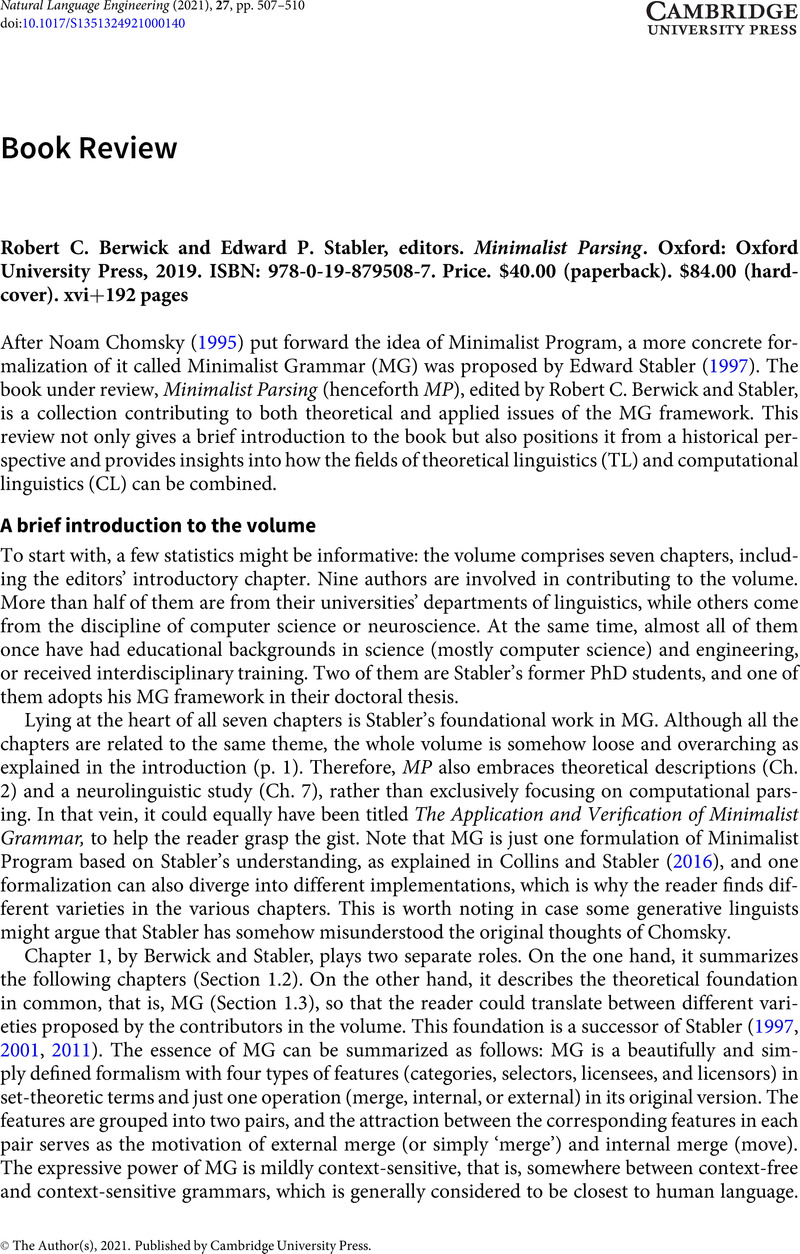No CrossRef data available.
Article contents
Robert C. Berwick and Edward P. Stabler, editors. Minimalist Parsing. Oxford: Oxford University Press, 2019. ISBN: 978-0-19-879508-7. Price. $40.00 (paperback). $84.00 (hardcover). xvi+192 pages
Published online by Cambridge University Press: 09 July 2021
Abstract
An abstract is not available for this content so a preview has been provided. Please use the Get access link above for information on how to access this content.

- Type
- Book Review
- Information
- Copyright
- © The Author(s), 2021. Published by Cambridge University Press
Footnotes
Tsy Yih is the transliteration of the name of the reviewer in his mother tongue, Shanghai Wu Chinese. He is also known as ZI YE in Mandarin pinyin.
References
Bale, A. and Reiss, C. (2018). Phonology: A Formal Introduction. Massachusetts: The MIT Press.Google Scholar
Carnie, A. (2013). Syntax: A Generative Introduction, 3rd Edn. Oxford: Wiley-Blackwell.Google Scholar
Collins, C. and Stabler, E. (2016). A formalization of minimalist syntax. Syntax 19, 43–78.CrossRefGoogle Scholar
Cornell, T. (1999). Derivational and representational views of minimalist transformational grammar. In Logical Aspects of Computational Linguistics: Second International Conference, LACL 1997, Nancy, France, September 22–24, 1997 Selected Papers, pp. 92–111.CrossRefGoogle Scholar
Harkema, H. (2001). Parsing Minimalist Languages. PhD thesis, University of California, Los Angeles, USA.Google Scholar
Kobele, G.M. (2006). Generating Copies: An Investigation into Structural Identity in Language and Grammar. PhD thesis, University of California, Los Angeles, USA.Google Scholar
Müller, S. (2018). Grammatical Theory: From Transformational Grammar to Constraint-Based Approaches, Second revised and extended edition. Berlin: Language Science Press.Google Scholar
Osborne, T., Putnam, M. and Gross, T.M. (2011). Bare phrase structure, label-less trees, and specifier-less syntax. Is Minimalism becoming a dependency grammar? The Linguistic Review 28, 315–364.CrossRefGoogle Scholar
Stabler, E. (1992). The Logical Approach to Syntax: Foundations, Specifications, and to Syntax Implementations of Theories of Government and Binding. Massachusetts: The MIT Press.Google Scholar
Stabler, E. (1997). Derivational Minimalism. In Logical Aspects of Computational Linguistics: Second International Conference, LACL 1997, Nancy, France, September 22–24, 1997 Selected Papers, pp. 68–95.CrossRefGoogle Scholar
Stabler, E. (2001). Minimalist grammars and recognition. In Rohrer C., Rossdeutscher A., and Kamp H. (eds.) Linguistics Form and Its Computation. Stanford: CSLI, pp. 327–352.Google Scholar
Stabler, E. (2011). Computational perspectives on Minimalism. In Boeckx C. (ed.), The Oxford Handbook of Linguistic Minimalism, pp. 617–642.Google Scholar
Stanojević, M. (2016). Minimalist Grammar transition-based parsing. In Logical Aspects of Computational Linguistics: Second International Conference, LACL 1997, Nancy, France, September 22–24, 1997 Selected Papers, pp. 273–290.CrossRefGoogle Scholar
Tesnière, L. (2015). Elements of Structural Syntax. Translated by Osborne T. and Kahane S. Amsterdam: John Benjamins Publishing Company.CrossRefGoogle Scholar





